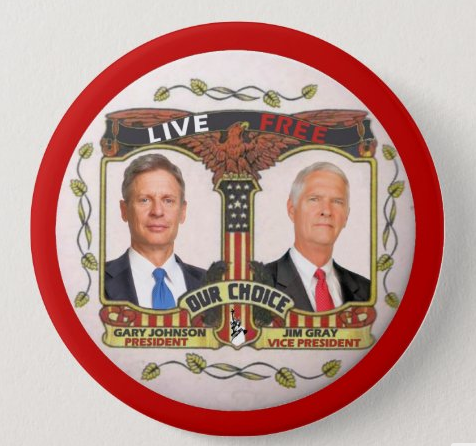James Polin Gray, February 14, 1945 (Washington, D.C.) -
VP candidate for Libertarian Party (aka Independent) (2012)
Running mate with nominee: Gary Earl Johnson (b. 1953)
Popular vote: 1,275,923 (0.99%)
Electoral vote: 0/538
The campaign:
Gary Johnson was the former two-term Republican Governor of New Mexico (1995-2003) who was regarded as an economic conservative who cut the size of state government, vetoed more bills than most governors, and encouraged the privatization of prisons. One of his few planks that spilled over into the progressive spectrum was his belief in the legalization of marijuana. In the 2008 Presidential election Johnson supported Ron Paul.
Johnson announced he was a candidate for the Republican nomination for US President in Apr. 2011. Putting his energy into the New Hampshire primary, he did manage to participate in two major Republican debates, but found himself excluded from the bulk of these high-exposure events. When it was clear it wasn't going to happen for him, Johnson switched gears and in late Dec. 2011 switched tracks and became a candidate for the Libertarian Party nomination.
The Libertarian Party, unlike the two majors, has a system where a candidate selects their running-mate far ahead of the convention. These pre-convention tickets are not always nominated together, but at least the proposed team allows the delegates to make a more informed decision. The selection of a Vice-President reveals quite a bit about the potential nominee. In Apr. 2012 Johnson announced his VP was Jim Gray, a retired California Superior Court Judge and Libertarian Party member since 1998. Gray, another former Republican, had previously run as a Libertarian for the US House and US Senate. He was noteworthy for his critical opinion on US drug laws.
It wasn't the first time a far-Right recent Republican office holder had nabbed the Libertarian nomination. Ron Paul in 1988 and Bob Barr in 2008, former US House members, turned out to be carpetbaggers. Following their national adventure in the LP they both returned to the Republican Mother Ship. Johnson, unlike the other two, had actually held an executive position in government. Any worries in 2012 about him being a short-term opportunist have since been cast aside as Johnson remains a Libertarian to this day.
Johnson's detractors contended his support for pot legalization and gay marriage grabbed enough headlines to obscure some of his more stringent conservative views, especially with Gray on the ticket underlining the drug issue. They pointed out that Johnson's campaign team included several people associated with far Right conspiracy-minded causes and groups.
On the other hand, Johnson's view of pot legalization and gay marriage was indeed more topical and mainstream than most of those in the Big Two parties, as events since 2012 have shown. To those who were into these causes as single-issue voters, Johnson's Right-wing policies probably were not all that important.
On the ballot in 48 states + DC + a registered write-in in one, the Johnson/Gray ticket finished in third place nationally with best results in New Mexico (3.55%), Montana (2.93%), Alaska (2.46%) and Wyoming (2.14%). They cracked 1% in 23 additional states. It was the highest number of popular votes in the history of the LP's Presidential runs up to that time, and the second highest percentage.
Johnson would run again in 2016 but with a different running-mate.
Election history:
1998 - US House of Representatives (Calif.) (Republican) - primary - defeated
2004 - US Senate (Calif.) (Libertarian Party) - defeated
2020 - Libertarian Party nomination for US President - defeated
Other occupations: Peace Corps, US Navy, attorney, superior court judge, author, playwright, member of the Libertarian Party Judicial Committee, member of the California Judicial Council
Notes:
One of his 1998 opponents was Robert "B-1 Bob" Dornan.
In the 2004 Libertarian primary, he defeated Gail Lightfoot.
His opponents in 2004 included Barbara Boxer (winner) and Marsha Feinland.



